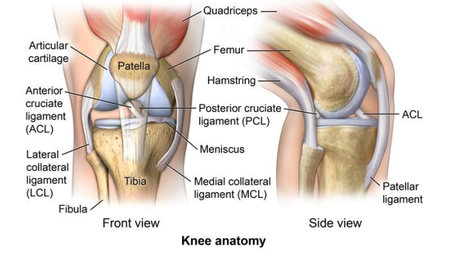Here is a full guide on what causes knee popping, possible diagnoses, and suitable treatments to solve your knee problems.
Possible Causes, Diagnosis, and Treatment
Knee popping can be a sensation that something is moving around in the knee. There may also be an audible sound associated with the popping, which in medical terms is called crepitus. This can also cause what we call mechanical catching or locking, which may make the knee feel like it is stuck in an extended or flexed position, and you have to move it in certain ways to get out of that. This knee popping sensation or sound or could be a very simple issue or it could be a sign that more serious damage is going on in the knee, so determining what is causing it is very important.
Why Do My Knees Pop? A Look Into Knee Anatomy:

So, the knees may pop and get in a certain position with certain activities such as walking, leaning forward, bending the knee, squatting down, etc. There are lots of things in the knee that can contribute to this popping sensation, so we must think about all the components of the knee. First, we have the bones: the femur (upper thigh bone), the tibia (lower leg bone), the fibula (smaller lower leg bone on the outside) and the patella. So, the relation of the bones to each other could be a potential source.
Next, you have cartilage between the femur and the tibia on both the inside, which we call medial, and the outside, which we call lateral. There is also cartilage between the kneecap and the trochlear area on the femur as well as between the tibia and the fibula.
Next, we have meniscal tissue where you have a lateral meniscus on the outside and the medial meniscus on the inside.
We have ligaments that are like duct tape that hold the bones together for the ligaments deep within the joint like the ACL and PCL, superficial ligaments such as the LCL and MCL just to name some.
Next, there are are the tendons. The tendons are the structures that attach the muscles to the bones, such as the quad tendon, and the patellar tendon.
Lastly, we have the actual muscles that help move the knee, such as the quadriceps and hamstring muscles.
Common Conditions That May Cause Popping Knees:
It could be something as simple as just some air bubbles that are in the joint fluid causing some of the sensations.
Causes:
- Mistracking of the kneecap in relation to the femur. This is what we call patellofemoral syndrome.
- Osteoarthritis or cartilage degeneration or fraying.
- Ligament or tendon snapping, either due to injury here because of a spur.
- Scar tissue, perhaps from prior surgery.
- Abnormal synovial fluid within the joint.
- Abnormal synovium, or the lining of the knee can be inflamed.
- Meniscal tear could be a cause.
- Then if you do have that catching or locking sensation that could be potentially a be tear of the meniscus that causes the meniscus to become out of place or flipped, such as a flap tear or bucket[1]handle tear.
- Also, it can be a loose body that is a broken off a piece of tissue such as cartilage, bone or meniscus that is floating in the joint causing problems.
What To Do About It:
First, it depends on what is causing the knee popping so you would need a thorough examination to figure these things out, and the cause would determine what are the potential treatments would be.
Potential treatments:
- RICE: resting, perhaps ice, heat, or compression, elevating the leg if there is some swelling.
- Perhaps wearing a brace can help.
- Doing some physical therapy to correct biomechanical problems, addressing muscle deficiencies and soft tissue problems could be helpful.
- Some of these issues may require surgery.
- A lot of these issues that may or may not have required surgery in the past can now be helped with newer more nonsurgical procedures via injections, which help your body heal itself such as prolotherapy, PRP or bone marrow concentrate.
- For example, if there is some patellofemoral syndrome, physical therapy would be a great place to start and if not helping enough, perhaps PRP or bone marrow concentrate which contains your stem cells would be a good choice.
- If there is some osteoarthritis, again physical therapy could be a good place to start with PRP and bone marrow concentrate being the next step, and surgery would be a last resort.
- If there is some scar tissue, there are certain injection based procedures that to help to loosen up scar tissue or in rare cases may need further surgery.
- If the ligament and tendon snapping are issues, likely physical therapy can help or PRP or bone marrow concentrate can help with injuries.
- If there is excess fluid or inflammation of the synovium, perhaps anti-inflammatories, aspirated out the fluid could be helpful, PRP or bone marrow concnetrate might be warranted, rarely surgery might be indicated.
- For meniscal tears, physical therapy, PRP, bone marrow concentrate can be very helpful. Only for rare meniscal tears and certain flap or bucket-handle tears, surgery may be required.
- If there is some catching, locking mechanical symptoms from those rare meniscal tears or some loose body in the knee that is actually causing the problem, which many times they do not, then perhaps surgery could be warranted as well.
Keeping Your Knees Healthy and Away From Popping:
- The first step to preventing the issue is maintaining healthy knees through regular exercise to keep the core, butt, and legs strong.
- Having a healthy diet to reduce inflammation. There are some supplements such as glucosamine, chondroitin, turmeric and fish oil that can be used to help reduce overall inflammation, which will reduce inflammation in the knees.
- If your knee does have an issue, have it checked out sooner rather than later by a physical therapist or a physical medicine doctor, preferably one who has alternatives to steroid injections and surgery as an only answer and that perhaps offers regenerative techniques like PRP, bone marrow concentrate, etc., like we do at the Centeno-Schultz Clinic.
THE BOTTOM LINE
Knee popping could be a mild or serious problem depending on the cause.
If you have this problem, get it checked out sooner rather than later by a musculoskeletal specialist.
If you do need more than a simple home treatment, even physical therapy, a doctor can write a specific script for therapy and if that fails, you would want to go to a doctor that has experience with regenerative medicine techniques like prolotherapy, PRP, or bone marrow concentrate, as we do at the Centeno-Schultz Clinic to provide options outside of masking symptoms with medicines, or invasive surgeries that are rarely needed.
Be sure to download Dr. Centeno’s Orthopedics 2.0 for more information on great ways to address knee popping along with her other musculoskeletal problems

